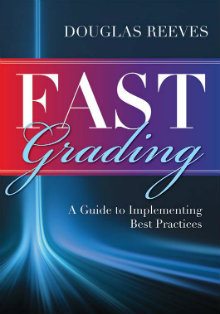Grading That’s Fair, Specific and Timely
FAST Grading – A Guide to Implementing Best Practices
By Douglas Reeves
(Solution Tree Press, 2016 – Learn more)
 Reviewed by Joyce Depenbusch
Reviewed by Joyce Depenbusch
I tend to be blunt, so I will tell you right off that this was not the book I was hoping to review. But, as it turns out, this was exactly the book I needed to read, review and apply.
The more I read Douglas Reeves’ take on best practices for grading reform, the more I knew that my district needs to share this book in a book study along with some sort of professional development. Then, and most importantly, we need to put many of these ideas to use as soon as possible.
 The title of the book can be deceiving if you take “fast” at face value – which is what I wished for initially. As a teacher buried under more school obligations than I want to think about, time is of the essence. Unfortunately, FAST may not be quick. Fair, Accurate, Specific, and Timely make up the acronym FAST.
The title of the book can be deceiving if you take “fast” at face value – which is what I wished for initially. As a teacher buried under more school obligations than I want to think about, time is of the essence. Unfortunately, FAST may not be quick. Fair, Accurate, Specific, and Timely make up the acronym FAST.
One of my co-teachers was hoping it meant the grades would jump off the page into the grade book. Sort of like some students want answers to jump onto their papers. No such luck!
Part I – Strategies to share
The book is arranged into three parts. Part I is on building relationships with teachers, parents and communities. It provides solid reasons why changing the grading system is truly fair, removing the distortion of zeros in grading on a 100-point scale.
Reeves offers discussion starters for staff meetings and reflections within each section. Specific strategies are shared providing some ideas that are being tested by school districts such as the Ketchup Solution for students who are failing or falling behind due to incomplete homework.
Cardinal Community School District in Iowa experienced a dramatic decline in student failures and suspensions when they implemented an intervention system that required students to be on track by Thursday afternoon of every week. If they were not on track, then they devoted Friday morning to the “Ketchup” room where they completed homework, received assistance, and otherwise got back on track.” Source
Part II – Implementing FAST grading
Part II is about implementing FAST grading and improving practices. It goes into detail on each part of FAST, how an improved grading system saves time and how to address unexcused absences, frequent tardies, and cheating.
Part III – Getting the message out
Part III considers FAST feedback throughout school systems and communities. The author suggests involving all stakeholders in open communication. This section also includes looking at grading through the perspective of sports coaches and teachers of the arts.
The value that can be gained from failed effort or peer support reminded me that all practice does not need to be graded. When the school band or choir is practicing for a performance, they are getting ready, taking risks, helping each other – and they can be judged on their final performance, not the steps leading to it. The same goes for the athletic teams’ practices before meets and games.
I remembered that some of our foreign exchange students were surprised that their homework was graded in our high school math classes. It was not done that way in their countries and they found it strange. Homework was given so they would get better at the concept, not to acquire a grade. We may be able to take a lesson from other disciplines and other countries to improve outcomes for students and provide fewer headaches for ourselves.
Helpful PD questions
Helpful aspects of the book include the well-organized discussion questions that are designed to assist with professional development sessions. One example involves staff being divided into three groups, each secretly given the same writing sample but with a different scoring agenda in mind. Then grades are compared. I think this would be an eye-opening experience for our staff.
Another is on figuring averages and how that can distort accurate grading. I like the examples given from real schools and would appreciate even more of that kind of specific information to help in this process.
Reeves has a website where readers can investigate further. I found myself asking about the loss of instructional time if students are pulled out for Ketchup sessions. It is a challenge already to teach the number of standards in our curriculum, so any more loss of time would need to produce some very positive outcomes and quickly, for that idea to be sold to the staff.
The view from my desk
Earlier in my teaching career, I taught third and fourth grade and we used S (satisfactory) and U (unsatisfactory) grading. Moving to middle school science and math, I recorded grades as rapidly as humanly possible and kept them to the nearest hundredth’s place of the decimal.
When grading late work, I followed the district’s policy of half credit if it was a day late for middle school students. Later than a day past due there was to be no credit for the work. I struggled with that last part and made exceptions when I felt they were justified.
I still try to maintain my grades as consistently and rapidly as possible, but I have lightened up a little on the decimal point and, while attempting to follow all school rules, accept late work. Have I gone soft after so many years of teaching? Do I feel pressure for all students to succeed? Am I adapting to research and what are thought to be better practices?
It could be that the answer is a combination of all these factors, and the result is a less rigid, more individual approach to being “fair” while reflecting on what students know. My goal is that students learn the skills and concepts; timing is important but not the end-all. I still feel that grades should mean something and should be earned, not given.
But I want my students’ learning to be more important than keeping track of so much minutia. This transition has been (and still is) a struggle over many years. I have lost sleep over rigor, student responsibility, and providing the best for my students. Have I found a better balance today than I did 20 years ago, thanks to honing my skills? I sure hope so. I continue to be a work in progress.
The book’s impact
Reeves states that “This book is meant to inspire teachers, administrators, school board members, and any other grading reform leaders to engage in conversation and take action collaboratively to improve and implement FAST grading policies that keep student learning at the forefront of education. “
I was inspired enough, before I had even finished the book, to speak with the superintendent of my district about the content of the book and the importance of scheduling professional development based on it. I am guessing that my enthusiasm for this book just got me more work by serving on an additional committee and leading some professional development. You’d think I would learn, and keep my mouth shut!
But I do think this should be time well spent if it results in turning around outmoded policies and impacting student learning positively throughout the district. Sounds like Reeves more than met his intended goal with this teacher.
Joyce Depenbusch has been involved in education in one way or another for nearly 40 years. In elementary and middle school classrooms and as the wildlife education coordinator for Kansas, she has combined her love of children and nature. Currently, she is a middle and high school science teacher in rural south central Kansas. Joyce enjoys presenting at workshops about ways to implement the NGSS and spending time on the family farm.
































Dear Joyce,
Thanks very much for the kind words. I’m always available for free video conferences for schools and districts that are doing book studies of FAST Grading or any of my other books. If I can offer any encouragement and support to your colleagues, please just let me know.
Best,
Doug